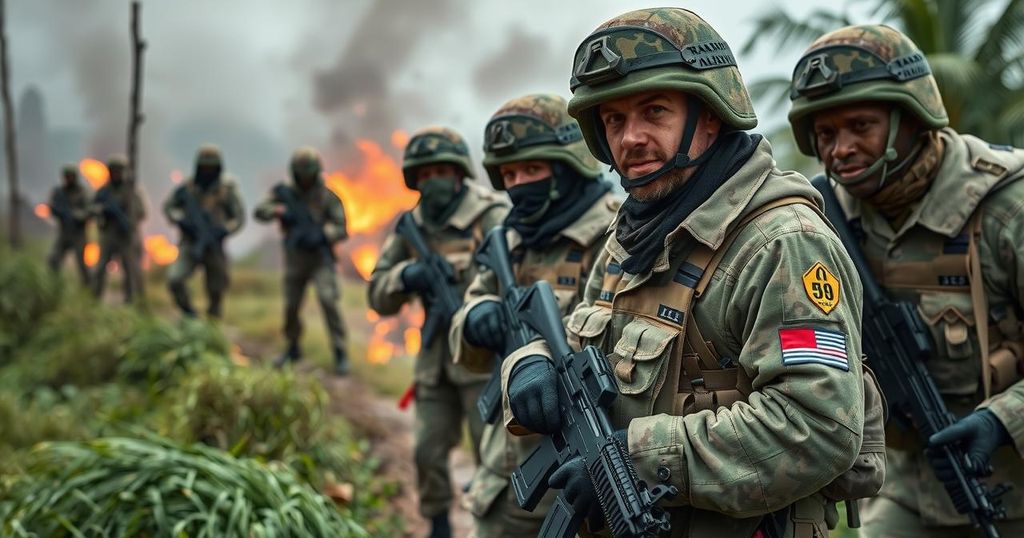In Goma, Colonel Romuald leads a team from Bulgarian firm Agemira, advising the Congolese army against the M23 militia, supported by Rwanda. The team, composed largely of former French soldiers, emphasizes a noble cause in combating foreign aggression. However, significant wage disparities between foreign contractors and local soldiers raise ethical concerns, while ongoing violence highlights the challenges in achieving stability despite foreign military assistance.
Colonel Romuald, a veteran of the French army with 36 years of service, is currently leading a team at the Bulgarian private security firm Agemira in Goma, a city in the conflict-ridden eastern Democratic Republic of Congo (DRC). His mission focuses on advising the Congolese military in their efforts against the M23 militia, a group believed to be receiving significant support from Rwanda. Agemira not only provides military advice but also facilitates arms agreements and supplies for Congolese soldiers. The team consists mostly of Romuald’s former colleagues from the French army, highlighting a camaraderie among those compelled to assist the DRC despite the perils involved.
Since the resurgence of the M23 in 2022, the Congolese government has sought assistance from foreign military contractors. Alongside Agemira, the Romanian military firm RALF, comprising around 800 personnel, has established a defensive perimeter around Goma. The personnel, many of whom are former members of the French Foreign Legion, refer to themselves as “Romeos” and reinforce the assertion of a shared mission against unlawful aggression in the DRC.
Romuald perceives their work as a morally significant endeavor, claiming that Rwanda is unlawfully exploiting DRC’s resources, which has exacerbated the humanitarian crisis in the region. He voiced a commitment to remain in the conflict zone until stability is restored, demonstrating a profound dedication to the cause. However, the situation remains precarious, with ongoing violence despite a declared ceasefire, and failed diplomatic efforts to resolve the conflict.
The discrepancies in compensation between foreign contractors and local Congolese soldiers have prompted criticisms of inequity. Foreign operatives reportedly earn significantly higher wages—between $5,000 and $6,000 per month—compared to local soldiers. Observers at the International Crisis Group have raised concerns about the potential ramifications of such disparities, which could foster resentment among the local military personnel.
Colonel Romuald insists that the personnel from Agemira and RALF do not operate for financial gain but rather for adventurous service. His characterisation of their role emphasizes a consultancy approach rather than engagement as mercenaries, which is illegal under European law. The distinction between these foreign contractors and other notorious mercenary outfits is underscored, as they are not directly involved in frontline conflict or exploitative activities in DRC’s mineral-rich areas.
Concerns regarding human rights violations and accountability are prevalent, but there have been no substantiated claims against Agemira or RALF regarding criminal behavior or misconduct in Goma. The complexities of the situation require careful monitoring of foreign military involvement in conflict zones and adherence to ethical engagement principles, with the aim of facilitating stability and peace in the region.
The Democratic Republic of Congo continues to face significant security challenges, particularly due to ongoing conflicts involving various armed groups, including the M23 militia. The mineral-rich regions of the DRC, especially North Kivu, are often the focal points for such conflicts, driven by both local grievances and external influences, particularly from Rwanda. The Congolese government has sought international assistance to bolster its military capabilities and address security threats, leading to the engagement of foreign mercenaries and military contractors. This situation raises questions about the ethical implications of private military involvement and the overall impact on local vulnerabilities and humanitarian needs.
The engagement of foreign mercenaries in Goma illustrates the complexities of contemporary conflict dynamics in the Democratic Republic of Congo. While entities like Agemira and RALF claim to uphold a noble cause against unlawful aggression and exploitation, disparities in treatment between foreign and local soldiers raise critical ethical questions. The persistence of violence despite foreign intervention underscores a need for comprehensive strategies that address both immediate security concerns and underlying economic and social challenges in the region.
Original Source: www.dw.com






